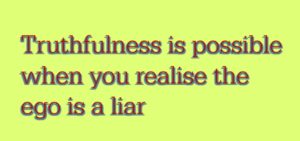 Truthfulness is a strange phenomenon. Scrupulous truth-telling may not be the same as real truthfulness. (Why?) Likewise with lying. A persistent liar is very unlikely to be able to be truthful to himself. And if untruthful to themselves, neither the scrupulous truth teller nor the liar is able to be truthful about themselves. But what about you?
Truthfulness is a strange phenomenon. Scrupulous truth-telling may not be the same as real truthfulness. (Why?) Likewise with lying. A persistent liar is very unlikely to be able to be truthful to himself. And if untruthful to themselves, neither the scrupulous truth teller nor the liar is able to be truthful about themselves. But what about you?
Truth or the con?
Someone who is truthful to him or herself is free of game-play and can simply tell the truth about him/herself. Such a one is also free to be uninhibited, self-respecting, and much more likely to see through the fudges and fantasies of the liars and those fixated on literalism.. So, how do you know if you are truthful to yourself? Let’s explore some of the fallacies.The greatest fallacy is supposing the ego can be non-egotistic. There must be some way that we can come from a deeper place than ego.
Ego fallacy no 1. “I have to be true to myself.”
Aha, this is the number one fudge by which people lie to themselves. It is NOT the same as being truthful to oneself. Think about the last time you said it yourself, or heard someone else say it. Wasn’t there just a hint (or a great big in-your-face obvious ploy) in that? Don’t you hear defensiveness in it? Defending what? I would suspect it defends some way the person is positioning the ego-self to demand respect for the inconsequential or the outright unrespectable. And “being true” to an ego position is intrinsically untruthful – the ego-self is a phantasm of wishful thinking, positioning itself as the centre of all it sees.
Ego fallacy no 2. “I am telling the truth”
Again, don’t you feel suspicious when someone says this? As though some lie is happening which has to be denied. And again, the defensiveness of it, the sound of someone defending a shoddy position.. An ego-self insisting on something that someone else finds unsupportable.
Ego fallacy no 3.”I never lie”
Hohoho… Remember the old adage about death and taxes? The only things that are certain in life? Nope, the other thing that is certain is that you lie sometimes, and everyone you know lies from time to time. Incidentally, if you are trying to get a job, do not tick “I don’t lie” on the personality test – it shows immediately that you have a shaky hold on reality. You have to get way beyond the notion of yourself as a “good person” to be remotely able to say that with any reliability.
Ego fallacy no 4. Everyone lies so it is ok if I lie
Talk about shonky! This is the life-plan of someone who can only front the world by manipulating you into supposing that reality is not what it is. Anyone who thinks “lying is just how you get what you want” is a sad shadow of a person, with very fundamental self-esteem problems. Even a spiritual teacher said it to me – he is very effective in many ways, but what is lurking at the base of his sense of self? Can a spiritual teacher really not see that lying is a disconnect with reality? Yes, it is paradoxical that every human lies from time to time, and yet lying as a tool for living is a loser’s plan. Reality wins every argument you have with it.
Then what is being truthful to oneself?
Truthfulness to oneself is a clear recognition, a realisation moment by moment in living, that what is real has precedence over what you prefer. It is an ability to see yourself as a set of processes and reactions rather than as a “someone”, and not be afraid to look clearly at the bundle of sometimes opposing motivations and desires hidden amongst those processes. It is the capacity to look to see the things that underlie your preferences, instead of dressing them up in rationalisation or denial. Often your behaviour demonstrates what your mind refuses to accept, but still won’t look at its own processes.
The normal ego-self doesn’t, can’t, won’t, do that looking, that investigating… Ordinarily, who will look so deeply into the self-sense to see what ego is? The one that says “I’m Jenny, I’m John” is satisfied with such a simple description, and doesn’t have the courage (or sometimes the means) to look to see how it is constructed, built out of thoughts and reactions to perceptions.
Truthfulness to self takes courage
Being truthful to yourself means allowing yourself to see what your motives really are, and give up the wishfulness of what you would like to think they are. This is difficult to uncover, because we are so used to inventing a nice idea of ourselves. Even those who murder others, steal from them or molest children cling to a wishful idea of themselves as justified in some way. Such examples are extreme, and easy to see. The example of your own self is less extreme but much harder to see – though the same process is taking place in you.
Having the courage to look, really look, may be difficult, and more so for those with personality dysfunctions like narcissism or paranoid tendencies, or avoidance patterns like histrionic reactions or somatising. But clinging to the sense of being a person, a special and interesting person, or even a good person, is an existential/spiritual disorder in the first place.
Can’t bear to look
Truthfulness to yourself means not fearing what you will find in yourself. Here are some of the things most can’t bear to find out about, and so they defend themselves by becoming hard, or denying the obvious:
-
-
the outcomes and effects of your behaviour on others. You’ll recognise this process when you find it too hard to say “sorry”. Instead you’ll rationalise and defend and declare that you’ve got nothing to be sorry for. And everyone else can hear the clang of discord in what you say, as you judge them instead of asking what they see in you.
-
the effect on yourself of someone else’s behaviour. This is when you just don’t want to know, because your ego fears the appraisal of another. So you cling to relationships that don’t work or are damaging for you or another. You wishfully think that you are ok even when to anyone else it is obvious that a heap of suppression is going on and that you are disconnected from feeling and emotional health.
-
your contribution to someone else’s behaviour towards you. The way to recognise this is when you blame the other person. Nice comforting feelings of self-righteousness stroke your ego. Often you hope that the other person will feel hurt by your blame, and that makes you feel even better. Yuck!
And so we just have to look, without fear of what we’ll find.
No spiritual enlightenment without it
If you are on a spiritual path, this work just has to be done. There is no enlightenment or Self-Realisation without it. There seems to be an idea – a post New Age idea, perhaps – that whenever you get an uncomfortable inkling, just brush it away by some meditative process, shift the bad feeling into a good feeling, and always think well of yourself, because after all, god lives in you and that is all that is important. Is that where truthfulness is, or is it a great hiding place for untruthfulness?
Everything changes if the work of really seeing the processes of personal self is undertaken. Bypassing that work only serves to reinforce the whole fiasco and gloss it over with a spurious feel-good strategy. And if there is a God in your belief system, you are inventing god in your own image if you don’t do it. Whatever a real divinity is takes second place to your pleasant self-serving fantasies.
Person vs Individual
So truthfulness to oneself surely comes with giving up a “this sort of person” sense of self, instead of cultivating it. But what then?
In really doing it, you might find that individuality and personality are two different things. Individuality is the wonderful diversity of life, sparkling and scintillating wherever it is found, amongst humans as well as the rest of life. Personal self is an idea invented by the mind and externalised as though it is a “you”. It is never free, and is always dishonest. Individuality simply expresses itself, without any agenda in its self-expression. Understanding that, or better, experiencing it, you can be truthful about yourself as well.
No neediness for validation
Then validation comes entirely from the playing out of what is real, and mental approval or disapproval is not relevant. This is such a big thing… to realise that your mind is not the arbitrator and adjudicator of truth – it only wants to be.
What you can do, what is entirely in your own domain, is to make sure you don’t perpetrate untruth. And you can call untruth when you see it or hear it – no more playing the game of pretend, with yourself or others.
Like this:
Like Loading...
 To become aware of the choices we make and being upfront about them – this is one way of getting to know ourselves better. Our choices are a clear reflection of us for all to see – we had better have a handle on them ourselves. But there are other ways of looking at choice – try these mind-bogglers.
To become aware of the choices we make and being upfront about them – this is one way of getting to know ourselves better. Our choices are a clear reflection of us for all to see – we had better have a handle on them ourselves. But there are other ways of looking at choice – try these mind-bogglers.



